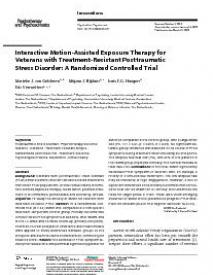Interactive Motion-Assisted Exposure Therapy for Veterans with Treatment-Resistant Posttraumatic Stress Disorder : A Randomized Controlled Trial
Background: Veterans with posttraumatic stress disorder (PTSD) tend to benefit less from evidence-based treatments than other PTSD populations. A novel virtual reality and motion-assisted exposure therapy, called 3MDR, provides treatment in an immersive, personalized and activating context.
Objective: To study the efficacy of 3MDR for veterans with treatment-resistant PTSD. Method: In a randomized controlled trial (n = 43) 3MDR was compared to a non-specific treatment component control group. Primary outcome was clinician-rated PTSD symptoms at baseline, after 3MDR, and at the 12-week and 16-week follow-up (primary end point). Intention-to-treat analyses of covariance and mixed models were applied to study differences between groups at the end point and over the course of intervention, controlling for baseline scores.
Results: The decrease in PTSD symptom severity from baseline to end point was significantly greater for 3MDR as compared to the control group, with a large effect size (F[1, 37] = 6.43, p = 0.016, d = 0.83). No significant between-group difference was detected in the course of PTSD symptoms during treatment when including all time points. The dropout rate was low (7%), and 45% of the patients in the 3MDR group improved clinically. The number needed to treat was 2.86.
Conclusions: In this trial, 3MDR significantly decreased PTSD symptoms in veterans with, on average, a history of 4 unsuccessful treatments. The low dropout rate may be indicative of high engagement. However, a lack of significant differences on secondary outcomes limits conclusions that can be drawn on its efficacy and underlines the need for larger phase III trials. These data show emerging evidence for 3MDR and its potential to progress PTSD treatment for veterans (Dutch Trial Register Identifier: NL5126).
In: Psychotherapy and Psychosomatics | 89 | 4 | july
https://www.karger.com/Article/Pdf/505977
Open Access


